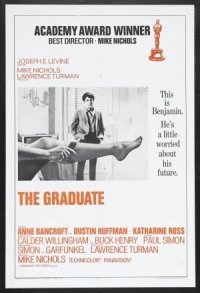
- HFPA
THE GRADUATE: A TRIUMPH FOR MIKE NICHOLS
August 12, 2011
—
HFPA

By Philip Berk
In 1968 the Hollywood Foreign Press got it right when they named The Graduate best picture, Mike Nichols as best director and Anne Bancroft best actress.
Granted, it was in the Best Comedy or Musical category, but no one that year recognized what today is considered a landmark film that influenced generations of filmmakers.
At the time of its release it was criticized for being safely ambiguous, but the youth audience knew better, and the film quickly became a box office smash. Today it’s considered a triumph of form over content, an entertainment that’s both liberating and exhilarating.
Dustin Hoffman admitted to me at a HFPA press conference that it may not be his best film but it is unquestionably “the best directed film I ever appeared in.”
The key to its success, of course, is Mike Nichols, and his welding of farce and realism established a new genre of movies, while his choice of Hoffman to play the lead broke with Hollywood tradition by spurning the conventional pretty faces. Steven Soderbergh has called Hoffman’s casting “the seminal event in the defining of motion picture leading men in the last 50 years.”
Ably assisted by screen writers Calder Willingham and Buck Henry, Nichols took a routine novel (by Charles Webb) and by suffusing it with humor and satire pulled off an irresistible mixture of despair, neurosis, hysteria and euphoria. The socio-comical satire is as sharp as ever and its many delicious moments are more reminiscent of a Nichols-May routine than the work of the two celebrated screenwriters.
Hoffman, of course is irreplaceable. His off the wall deadpan humorous delivery is priceless yet at the same time he can break your heart. And Anne Bancroft as the rapacious Mrs. Robinson is electrifying. It’s hard to believe Nichols’ first choice for the role was Doris Day.
The rest of the cast (William Daniels, Murray Hamilton, and Elizabeth Wilson) could well have stepped out of a Nichols-May stock company.
Also contributing to the uniqueness of the film was Simon and Garfunkel’s score. Granted, their songs, Sounds of Silence and Scarborough Fair, were not written for the film, but Mrs. Robinson was, although years later Simon claimed the song was originally titled Mrs. Roosevelt (yes, FDR’s wife.) Maybe that’s why the Academy failed to qualify it. Their choice that year was Talk to the Animals from Dr.Doolittle. Anyone remember that?
As well as the Golden Globe, Nichols won the Academy Award and the New York Critics’ award for his direction, a consolation for having being passed over the previous year for Who’s Afraid of Virginia Woolf.
That year when his name was called as nominee at the Directors Guild Awards banquet he had never attended a Hollywood award event before and he rushed to the stage only to realize that Fred Zinnemann was the actual winner (for A Man for All Seasons.).